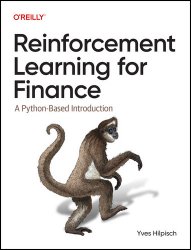 Название
Название: Reinforcement Learning for Finance: A Python-Based Introduction (Final Release)
Автор: Yves Hilpisch
Издательство: O’Reilly Media, Inc.
Год: 2025
Страниц: 215
Язык: английский
Формат: True/Retail PDF, True/Retail EPUB
Размер: 20.3 MB
Reinforcement Learning (RL) has led to several breakthroughs in AI. The use of the Q-learning (DQL) algorithm alone has helped people develop agents that play arcade games and board games at a superhuman level. More recently, RL, DQL, and similar methods have gained popularity in publications related to financial research.
This book is among the first to explore the use of reinforcement learning methods in finance.
Author Yves Hilpisch, founder and CEO of The Python Quants, provides the background you need in concise fashion. ML practitioners, financial traders, portfolio managers, strategists, and analysts will focus on the implementation of these algorithms in the form of self-contained Python code and the application to important financial problems.
Reinforcement Learning has enabled a number of breakthroughs in AI. One of the key algorithms in RL is deep Q-learning (DQL) that can be applied to a large number of dynamic decision problems. Popular examples are arcade games and board games, such as Go, in which RL and DQL algorithms have achieved superhuman performance in many instances. This has often happened despite the belief of experts that such feats would be impossible for decades to come.
Finance is a discipline with a strong connection between theory and practice. Theoretical advancements often find their way quickly into the applied domain. Many problems in finance are dynamic decision problems, such as the optimal allocation of assets over time. Therefore it is, on the one hand, theoretically interesting to apply DQL to financial problems. On the other hand, it is also in general quite easy and straightforward to apply such algorithms—usually after some thorough testing—in the financial markets.
In recent years, financial research has seen a strong growth in publications related to RL, DQL, and related methods applied to finance. However, there is hardly any resource in book form—beyond the purely theoretical ones—for those who are looking for an applied introduction to this exciting field. This book closes the gap in that it provides the required background in a concise fashion and otherwise focuses on the implementation of the algorithms in the form of self-contained Python code and the application to important financial problems.
This book covers:
Reinforcement learning
Deep Q-learning
Python implementations of these algorithms
How to apply the algorithms to financial problems such as algorithmic trading, dynamic hedging, and dynamic asset allocation
This book is the ideal reference on this topic. You'll read it once, change the examples according to your needs or ideas, and refer to it whenever you work with RL for finance.
Target Audience:
This book is intended as a concise, Python-based introduction to the major ideas and elements of RL and DQL as applied to finance. It should be useful to both students and academics as well as to practitioners in search of alternatives to existing financial theories and algorithms. The book expects basic knowledge of the Python programming language, object-oriented programming, and the major Python packages used in Data Science and Machine Learning, such as NumPy, Pandas, Matplotlib, Scikit-learn, and TensorFlow.
Скачать Reinforcement Learning for Finance: A Python-Based Introduction (Final Release)
[related-news]
[/related-news]